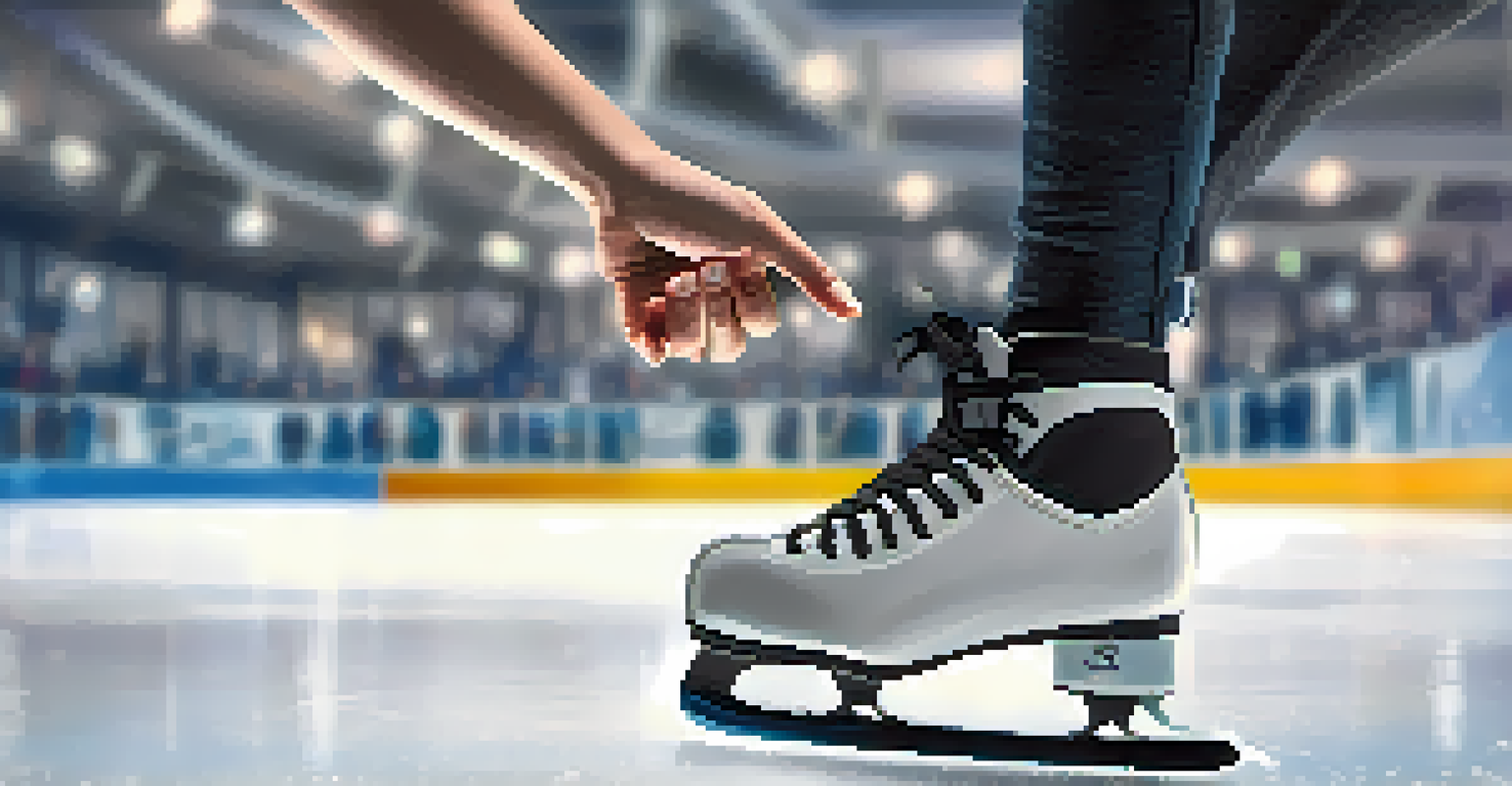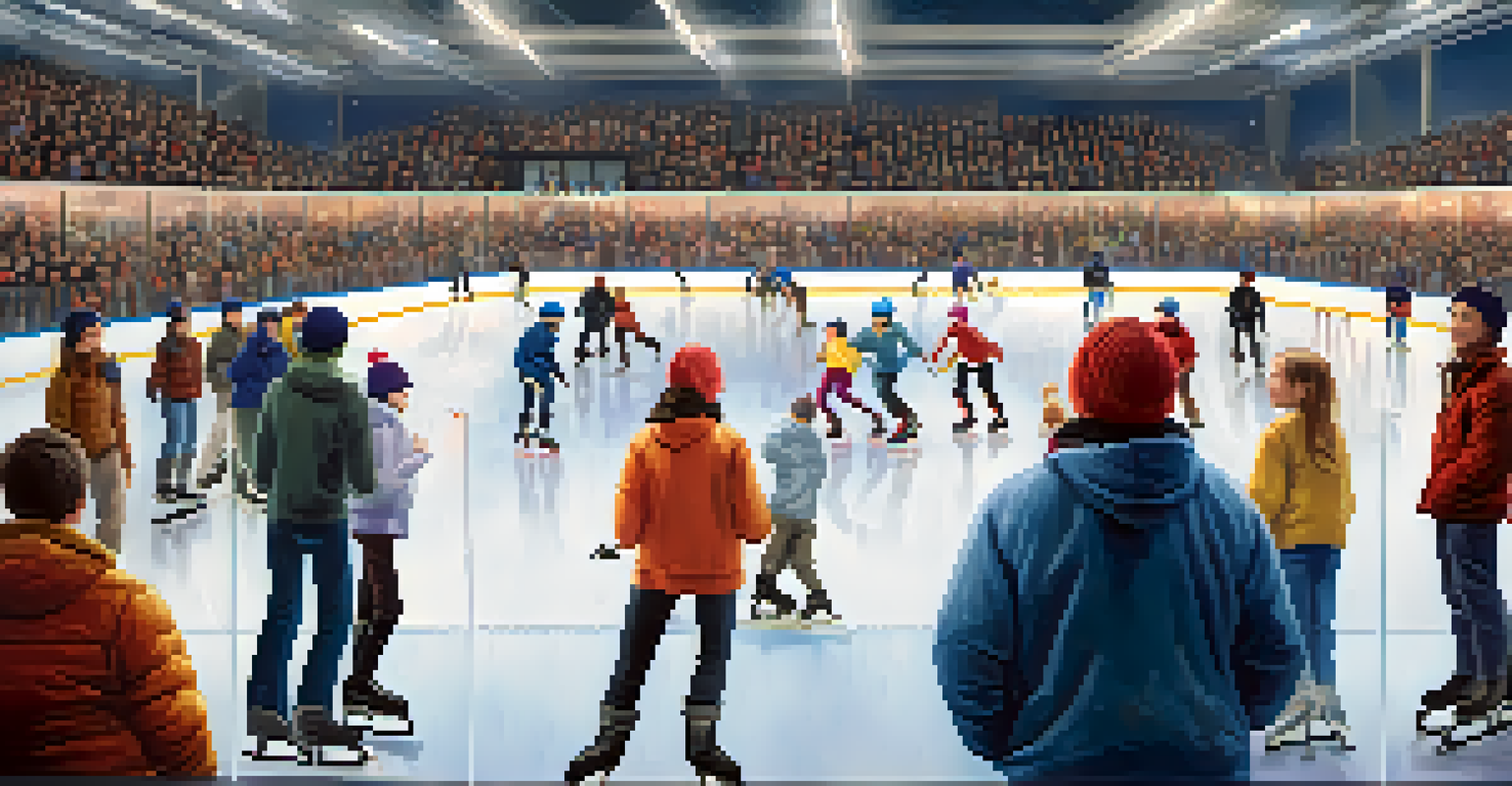Ice Skating Coaches: Finding the Right Coach for You

Understanding the Role of an Ice Skating Coach
An ice skating coach plays a pivotal role in your skating journey, guiding you through the fundamentals and advanced techniques. They help you develop skills, build confidence, and achieve your personal goals on the ice. A good coach not only instructs but also motivates, ensuring that the experience is enjoyable and rewarding.
A good coach can change a game. A great coach can change a life.
Think of your coach as a partner in your skating adventure. They help you navigate challenges, whether it’s mastering a jump or perfecting your spin. With their expertise, you can accelerate your learning curve and develop a deeper love for the sport.
Ultimately, the right coach will tailor their approach to meet your unique needs, making your training both effective and enjoyable. The bond you form with your coach can significantly influence your progress and passion for ice skating.
Identifying Your Skating Goals and Needs
Before you start searching for a coach, it’s essential to identify your skating goals. Are you aiming for competitive success, or do you want to skate for fun? Understanding your objectives will help you find a coach who specializes in that area.

Consider your current skill level as well—are you a beginner, or do you have some experience under your belt? This not only helps you set realistic expectations but also allows you to find a coach who can meet you at your level and push you further.
Find Your Skating Goals First
Identifying your skating objectives is essential to selecting a coach who aligns with your aspirations.
By clarifying your goals and needs, you can narrow down your options and focus on coaches who align with your vision. This clarity will make the coaching experience more fulfilling and productive.
Researching Potential Coaches in Your Area
Once you’ve defined your goals, it’s time to start researching coaches in your area. Look for local rinks or skating schools that offer coaching services and read reviews from former students. Personal recommendations from friends or fellow skaters can also provide valuable insights.
The relationship between coach and athlete is one of the most important aspects of sports.
Don’t hesitate to check online platforms and social media for additional information. Many coaches share videos of their training sessions, which can give you a feel for their teaching style and philosophy. This research phase is crucial to ensure you find a coach who resonates with you.
As you gather information, create a shortlist of potential coaches who seem promising. This list will set the stage for the next step in your journey—reaching out and asking questions.
Evaluating Coaching Styles and Qualifications
Every coach has a unique teaching style, and it’s important to find one that aligns with your learning preferences. Some coaches may adopt a more structured approach, while others might focus on creativity and exploration. Understanding these differences can help you make an informed decision.
In addition to their coaching style, consider their qualifications and experience. A coach with a background in competitive skating or a relevant coaching certification can bring valuable insights and techniques to your training. Their expertise can greatly influence your development.
Research Coaches in Your Area
Thoroughly researching local coaches and their styles helps ensure a good match for your learning needs.
Don’t forget to pay attention to how they communicate and interact with their students. A coach who fosters a positive environment can make a significant difference in your learning experience and overall enjoyment of the sport.
Scheduling a Trial Lesson: What to Expect
Many coaches offer trial lessons, which can be a fantastic way to gauge compatibility. During this session, you can observe their teaching style, communication, and how well they connect with you. It’s an opportunity to see if their approach feels comfortable and motivating.
Expect the trial lesson to be a mix of skill assessment and practice. The coach may evaluate your current abilities and suggest areas for improvement. This feedback is valuable as it not only gives you insight into your skills but also how the coach plans to help you grow.
After the lesson, reflect on your experience. Did you feel supported and encouraged? Were you able to communicate openly? These reflections will help you determine if this coach is the right choice for your skating journey.
Discussing Logistics and Coaching Fees
Once you’ve narrowed down your options, it’s essential to discuss logistical details, including coaching fees, schedules, and locations. Understanding the financial commitment involved will help you plan accordingly and avoid any surprises later on.
Coaching fees can vary widely based on experience, location, and session length, so it's important to find a coach that fits your budget. Some coaches may offer package deals, which can be a cost-effective option if you’re committed to regular lessons.
Build a Strong Coach Relationship
Establishing open communication with your coach fosters trust and enhances your overall skating experience.
Also, discuss the frequency of lessons that work best for you. Consistency is key in skating, so establishing a regular schedule with your coach will help you stay on track and make steady progress.
Building a Positive Coach-Athlete Relationship
A successful coaching experience hinges on the relationship between you and your coach. Open communication is crucial; don’t hesitate to express your thoughts, concerns, or goals. This dialogue fosters trust and ensures that your coach is aware of your needs.
As you continue training, be receptive to feedback and willing to adapt. Remember that constructive criticism is part of the learning process. A good coach will guide you through challenges, helping you grow both as a skater and an individual.

Building this relationship takes time, so be patient and give yourself the space to grow. As you develop mutual respect and understanding, your coaching experience will be enriched, making your time on the ice even more enjoyable.